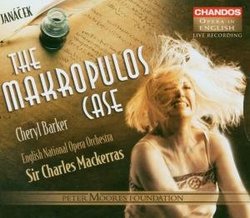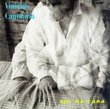| All Artists: John Wegner, Leos Janacek, Spoken Word, Charles Mackerras, Kathleen Wilkinson, Susanna Tudor-Thomas, English National Opera Orchestra, Cheryl Barker, Elena Xanthoudakis, Graham Clark, John Graham-Hill, Robert Brubaker, Thomas Walker Title: Janácek: The Makropoulos Case Members Wishing: 0 Total Copies: 0 Label: Chandos Original Release Date: 1/1/2007 Re-Release Date: 3/27/2007 Genres: Special Interest, Classical Styles: Opera & Classical Vocal, Historical Periods, Modern, 20th, & 21st Century Number of Discs: 2 SwapaCD Credits: 2 UPC: 095115313824 |
Search - John Wegner, Leos Janacek, Spoken Word :: Janácek: The Makropoulos Case
 | John Wegner, Leos Janacek, Spoken Word Janácek: The Makropoulos Case Genres: Special Interest, Classical
|
Larger Image |
CD DetailsSimilarly Requested CDs
|
CD ReviewsMAKROPOULOS IN ENGLISH - WITH MACKERRAS Klingsor Tristan | Suffolk | 03/28/2007 (4 out of 5 stars) "This is a recording of pluses and minuses. On the plus side, it's sung in English, a major benefit in this of all operas with its complex plot centred around the most tortuous legal case since Jarndyce vs. Jarndyce in Dickens' Bleak House. To be able to follow the intricacies of the developing relationships between Emilia Marty and the other characters and all the ironic hints at the true nature of her `case' is a huge help. Against that it must be said that the intonations of the Czech language that are so fundamental to Janacek's musical language do not translate easily into English: there are some pretty strange and unnatural stresses sprinkled about the English text. It would be fascinating to hear what Janacek made of the rise and fall of our language as he was once seen, while visiting England, busily setting down conversations in musical notation without speaking a word of English!
The second big plus, of course, is Sir Charles Mackerras' conducting. It is impossible to overestimate the importance of Mackerras in our understanding of Janacek, both in his scholarship, elucidating Jancek's real intentions from the frustratingly indecipherable manuscripts (he talks fascinatingly about this in the interview included with this issue), and in performance, proselytising the composer's cause throughout the world. It is fairly safe to say that Janacek would not now hold such a secure place in the repertoire of the world's opera houses were it not for Sir Charles. He has recorded Makropoulos before on a famous, almost definitive Decca recording with the wonderful Elisabeth Soderstrom in the title role and the Vienna Philharmonic realising all Janacek's individual orchestration with their usual flair. The ENO orchestra is not quite in that class technically, but their playing for Mackerras is totally committed and truly idiomatic. Compared to that Vienna performance, there is a greater urgency about the playing in the first two Acts which perhaps derives from the fact that this is a live performance. It works well for the rising passions of Gregor, Prus and Janek and also of course in realising Janacek's amazingly taut musical argument, often turning from idea to idea in a flash. Sir Charles is a little more expansive in the final scenes as the truth about the Vec are revealed. Here he seems to bring his whole lifetime's experience of this music to bear in - orchestrally at least - the most moving interpretation I've ever heard, even from him. (Vec, by the way, is a practically untranslatable Czech word that incorporates the Court Case, Hieronymus's actual Greek document that holds the magic formula, as well as the whole Makropoulos matter that is the subject of the opera. Makropoulos `Case' is probably the best English translation, but still inadequate to include all that.) The singing is not quite in the same class. The old Decca recording, as I've said, has a wonderful Marty in Soderstrom and an otherwise wholly Czech, thoroughly idiomatic cast. In his interview, Sir Charles harks back further to the first production at English National Opera (then Sadler's Wells) with the much missed Marie Collier. She really was the business, capturing fully the star-quality and charisma of Marty, her ability to twist men around her little finger, combined with an aching world-weariness. Those last scenes in that production were among the great operatic experiences of the 60's and 70's - so concentrated, so overwhelming that one left the theatre feeling totally drained. Cheryl Barker is no match for either of those special sopranos (nor for Anja Silja in the Glyndebourne DVD) - she's too one-dimensional, too much the bitch to elicit our sympathy, even at the end. And thinking back to those early Sadler's Wells casts (which usually included the likes Gregory Dempsey as Gregor, Raimund Herincx as Prus, Eric Shilling as Kolenaty and Emil Belcourt as poor mad Hauk Sendorf) one has to say that the current ENO ensemble has lost quite a bit in the intervening years. The cast on this disc is fine, good on characterisation, adequate in singing, but not enough to erase memories. Nevertheless, this issue is much to be welcomed - first for giving us Makropoulos in English and second for (another) magnificent performance from Mackerras." |

 Track Listings (13) - Disc #1
Track Listings (13) - Disc #1






